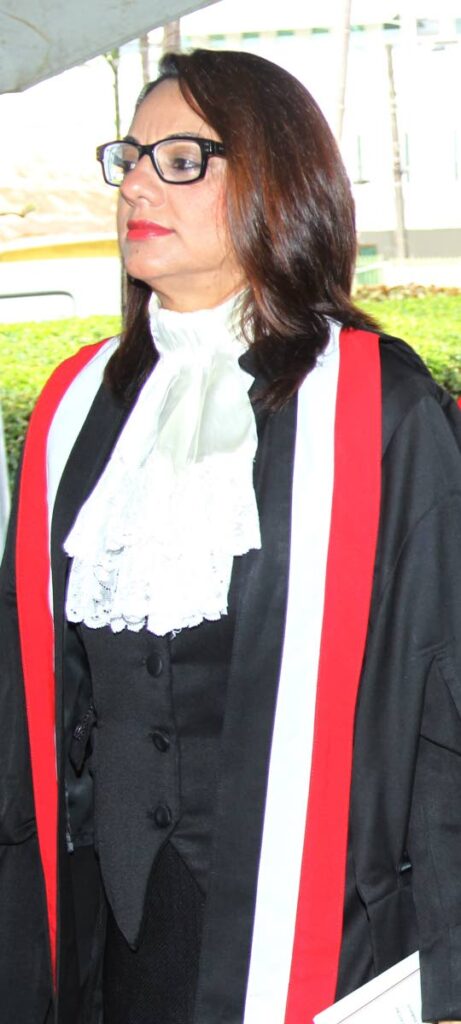Judge slams delay by Mercy Committee, prisons

SIX condemned prisoners whose applications before the Mercy Committee were left languishing for more than half a decade after their death sentences were commuted will finally be resentenced by a criminal court.
The order was made on Friday, by Justice Nadia Kangaloo who was critical of the delay by the authorities to treat the cases of Edmond Beckles, Elvis Penny, Joseph Walcott, Ronald Tiwari, Ronald Lee, Glenroy Francis and Clive Smart.
In referring their cases to the criminal judges, Kangaloo said their decisions were informed by the realities of crime and punishment in TT.
‘Is it not a disgrace that I cannot say the same for the Prison Service and the Mercy Committee?”
Attorneys for the six had filed a constitutional claim which complained of the Mercy Committee's delay in complying with orders from the Court of Appeal and the Privy Council, which had commuted the death sentences.
Their cases were sent to the Mercy Committee for consideration. The six filed their constitutional claim when they heard nothing from the committee on any hearing to make their case for release. They also complained of the prison service's failure to review their incarceration and make reports.
“It is now some 11-27 years since the date of the original violations for each of the applicants; six years since the declaration of the violation by the Court of Appeal; and three years since the endorsement of those orders by the Judicial Committee of the Privy Council.”
In her ruling on Friday, Kangaloo said as a constitutional court, she was left to consider if it should be a catalyst for change and a remedial innovator.
In assessing the complaints of the six, she said in addition to delay, there was the inaction of both the Mercy Committee and the prison and, in some instances, complete non-response or a lack of engagement with the prisoners.
Taking up the mantle of judicial activism, the judge addressed what she called “the egregious circumstances in which the arms of the State found themselves.
“This court is of the view that the unacceptable delay and/or refusal and/or ignorance of the declarations, and the orders that have been made from courts from top to bottom of this jurisdiction were a death knell for a constitutional democracy in this jurisdiction.”
While acknowledging the crimes for which the six were convicted, she said, however, “to imprison someone without any prospect of ever being released may be a punishment which is cruel and unusual and accordingly a breach of Section 5 (2)(b) of the Constitution.”
She said any sentence, other than death, must offer some form of a possibility of release and there must be a review system in place and there were processes in place.
However, she said these systems and processes were “not worth the paper they are written on,” given what took place in this case.
“We have processes, we have reviews, we have commutation. What we do not have is the opportunity for these claimants to be heard both pre- and post-commutation with regard to what ought to be in the current and contemporary circumstances of their detention and appropriate sentence.
“These claimants have been left in limbo. These claimants remain in uncertainty.”
Kangaloo said even with the removal of the death sentence, given the delays, the men were still subjected to cruel and unusual punishment because of the delay.
“This court finds that there is no distinction between those two scenarios to remain post-commutation with all avenues of ascertaining the length of your sentence robs the claimants of that opportunity to rehabilitate themselves, to improve themselves, work towards rehabilitation.”
She said as far as the court was concerned, the six remained before the prison and Mercy Committee as “faceless beings” whose identities as individual human beings were ignored, and they were deprived of a voice and locked behind a door with the key thrown away.
“Any residual dignity that may have resided with these claimants surely be at risk of evaporating,” she said.
She also asked, “How can it not be pellucid that recidivism will remain the legacy of our prison service rather than rehabilitation?
“The authorities have refused to subject themselves to the discipline of our Constitution…and they have chosen to remain in ignorance of this. They have fiddled while the hopes of men burn.”
In granting the declarations the six sought, the judge also refused to send their matters back to the Mercy Committee, saying that would be a defective remedy for the court to order.
“The court will never make an order in vain.”
She also ordered the State to pay the men’s costs.
They were represented by Douglas Mendes, SC, Rajiv Persad, SC, Vanita Ramroop, Larry Boyer and Ajesh Sumessar, Peter Carter and Dana-Marie Smith
Representing the State were Fyard Hosein, SC, Rishi Dass, SC, Svetlana Dass, Adana Hosang, Vincent Jardine, Tiffany Kissoon and Fazana Ali.

Comments
"Judge slams delay by Mercy Committee, prisons"